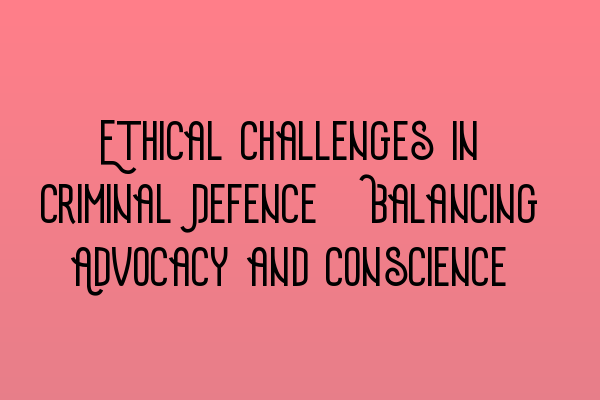Ethical Challenges in Criminal Defence: Balancing Advocacy and Conscience
In the world of criminal defence law, practitioners often face ethical challenges that require a delicate balancing act between zealous advocacy for their clients’ interests and adhering to their own moral compass. This struggle between advocating for a client’s legal rights and upholding personal convictions can create numerous dilemmas that demand careful consideration and introspection.
The Duty of Advocacy
As criminal defence solicitors, our primary duty is to vigorously advocate for our clients and ensure they receive a fair trial. This duty guides us to explore every avenue, challenge the prosecution’s evidence, and present the strongest possible defense. It is a commitment that requires us to leave no stone unturned and exhaust all legal avenues available to secure the best outcome for our clients.
However, this duty of advocacy can sometimes clash with our personal beliefs and principles, leading to ethical dilemmas that demand our attention. We find ourselves questioning whether we should defend a client we believe to be guilty or represent individuals whose actions conflict with our own values. These situations force us to strike a delicate balance between our role as advocates and our personal conscience.
The Conscience Conundrum
Defending individuals accused of heinous crimes can be morally conflicting. We may find ourselves representing clients whose actions go against our own principles, challenging our deeply-held beliefs or personal experiences. In such instances, we must confront our own biases and set them aside to serve our clients effectively.
While it is crucial to respect and uphold the principle of the presumption of innocence, it is natural to experience internal conflicts when a client’s actions are deeply disturbing. Nevertheless, it is our duty to set aside our personal beliefs and emotions, focusing instead on providing competent representation within the bounds of the law.
Professional Competence and Negligence
Another ethical challenge criminal defence solicitors often face relates to professional competence and negligence. As legal practitioners, we are expected to possess the necessary knowledge, skills, and expertise in criminal law to provide competent representation. Failing to meet this standard may result in professional negligence claims and potential harm to our clients.
Therefore, it is imperative that we remain updated with the latest developments in criminal law and practice. Engaging in continuous legal education, attending relevant seminars, and participating in professional development courses such as SQE 1 Practice Exam Questions and SQE 1 Preparation Courses are essential to ensure we possess the requisite knowledge and skills to provide competent representation to our clients.
Staying Ethically Grounded
While the practice of criminal defence law comes with its ethical challenges, it is crucial to stay ethically grounded and maintain our integrity throughout the process. Upholding ethical standards not only ensures the fair administration of justice but also safeguards our own professional reputation and credibility.
To navigate this delicate balance, it is important to engage in regular self-reflection, seeking guidance from seasoned professionals within the legal community, and staying informed about professional ethics and conduct rules. Participating in SQE 2 Preparation Courses and staying updated with SRA SQE Exam Dates can help in maintaining ethical awareness and professional growth.
Finally, remember that reconciling conflicting interests and ethical challenges is an ongoing process. It requires constant introspection, open-mindedness, and a commitment to the principles that form the foundation of our legal system.
As criminal defence solicitors, we play a vital role in upholding the rights of the accused, regardless of personal opinions. By striking a balance between advocacy and conscience, we can ensure justice is served, even in the face of ethical challenges.
For more information on the SQE exams and preparation, we recommend checking out the following related articles:
